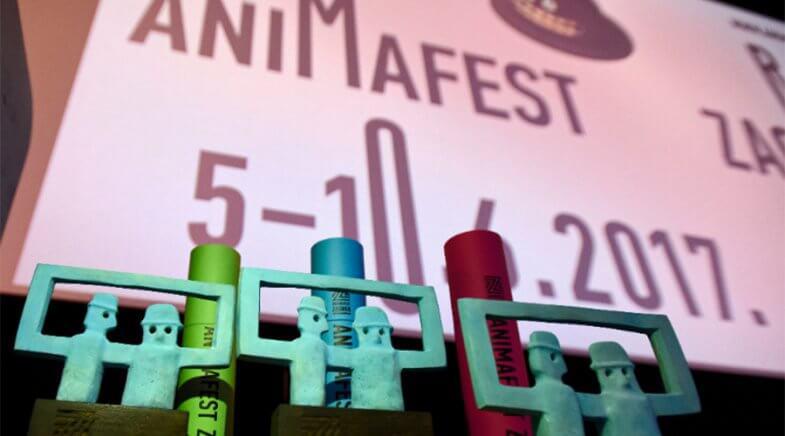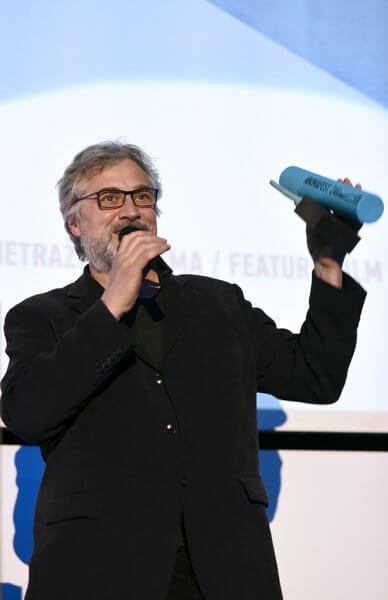Animafest 2017 Winners Announced
 The 27th World Festival of Animated Film – Animafest Zagreb ended on Saturday with the award ceremony held in Cinema Europa, following an extraordinary six days devoted to animation, with over 350 films in the programme and numerous side events.
The 27th World Festival of Animated Film – Animafest Zagreb ended on Saturday with the award ceremony held in Cinema Europa, following an extraordinary six days devoted to animation, with over 350 films in the programme and numerous side events.
The Grand Competition – Short Film jury, consisting of Michaela Pavlátová, Rosto, Amid Amidi, Nobuaki Doi and Marko Tadić decided to give the Grand Prix – Short Film to the film Nighthawk by Špela Čadež, produced by Finta Film, Radio-Television of Slovenia and Bonobostudio.
This seemingly simple but surprisingly complex film adds a new layer to a traditional animation technique of multiplane cut-out. It uses parallel storytelling to switch between different perceptions to effectively create an extremely engaging tragedy of a man/animal.
The same jury awarded The Golden Zagreb Award for creativity and innovative artistic achievement to Jonathan Vinel for his film Martin Cries (France, AKA Productions).
The violent fantasy of videogame culture finds new meaning — and beauty — in this wistful tale of a teenager who is ghosted by his best friends. Vinel takes the dissonant qualities of videogames and cinema, and integrates them in a wholly unique and organic manner. His mastery of digital filmmaking tools is more important than the tired debate of: “Is machinima animation?” To us, creativity and innovation means the ability to transcend simplistic labels and categories, and embracing whatever tools necessary to uncover new perspectives and meaning through animation.
Zlatko Grgić Award for the best first film made outside of an educational institution was awarded to Swedish-Estonian film Amalimbo (Fasad, Fork Film Animation Studio, Film Väst) by Juan Pablo Libossart.
This short story takes us on a beautifully crafted emotional journey through a symbolic, undefined but eerily familiar world of wonder to which we escape when we struggle our demons and where, after all, we find our inner peace.
Each of the jury members also presented one special mention award. Michaela Pavlátová gave the award to the Finnish film Sore Eyes For Infinity, by Elli Vuorinen praising it as “a surprising, fresh film with beautiful animation and visuals which bring us to eternity”.
Rosto was particularly impressed with the Spanish film Orogenesis by the French director Boris Labbé because it “ploughs through time and space with relentless thrusts, forcing massive mountains to split, tear and stretch in such an uncanny way it made my stomach turn. The soundtrack, which was equally convincing yet alienating, is such an integral part of the whole experience that it was impossible to escape. I could only sit back and enjoy this immersive trip”.
Amid Amidi singled out the Canadian film Change by Jonathan Ostrem because “it is a constantly surprising and engaging piece of experimental cg that took the viewer on an otherworldly journey and continually disorients and reorients a viewer’s sense of time and space”.
Nobuaki Doi, on the other hand, selected the German film Ugly by Nikita Diakur: “There are still unexplored fields of artistic expression of CGI. This film is a perfect example of it. The dynamic but inertia movement rebuilds everything and allows us dream of a world where everything is much better than here”.
Lastly, Marko Tadić presented his special mention award to Eva Cvijanović for Canadian-Croatian Hedgehog’s Home, produced by National Film Board of Canada and Bonobostudio. “Many lives have been moulded by this short and symbolic story that brought joy to many kids of all ages. I am a living proof that even after hearing it six trillion times in one car ride to the seaside it does not ever get boring” said Tadić.
By the decision of Grand Competition – Feature Film jury consisting of Natalia Lukinykh, Ben Mitchell and Simon Bogojević Narath, Grand Prix – Feature Film went to The Red Turtle (France, Belgium Japan), by Michaël Dudok de Wit, produced by seven companies led by Ghibli and Wild Bunch studios:
While the decision to award one film out of many works of astonishingly high quality is inevitably a difficult one, the film that we feel most deserving of the Grand Prize reached us all for the same reasons. Driven by absolutely masterful animation executed by a team of artists with a staggering attention to detail and character performance, this film boasts a joyful interplay between its visuals and a divine orchestral score. As a celebration of both the unforgiving brutality of nature – as well as its life-affirming beauty – that lingers with the audience for long after, we’re delighted to award the feature film Grand Prix to Michaël Dudok de Wit’s The Red Turtle.

Michaël Dudok de Wit
The same jury also awarded their special mention award to Louise by the Shore (France, Canada) by Jean-François Laguionie and The Girl Without Hands (France) by Sébastien Laudenbach with the following words:
Our special mentions go to two films that do a wonderful job exploring loftier themes of humanity, self-reflection and self-preservation. While disparate in style, the distinct visual identities of each film are matched by thoughtful and engaging storytelling with strong, charming female leads at their core.
Student Film Competition and Croatian Film Competition jury consisting of Alberto Vázquez, Jana Jakoubek and Sandra Malenica decided to give Dušan Vukotić Award for the best student film to Polish film Pussy by Renata Gąsiorowska, made at National Film School in Lodz.
Feminism has gone one level up. Actually feminism in this film is at it’s right point – totally open, free, spontaneous, above all and in front of us in the most literal way. Talking about sexuality is still taboo, especially womens’ sexuality. That’s why this film is fresh, fun, sensitive and real. It is also fluent in storyline, simple in drawing, great in sound and animation. It is reminder that female ‘body parts’ also have the life of their own. At least in films. The jury awards the Dušan Vukotić award for best student film to the courageous and beautiful Pussy by Renata Gąsiorowska.
The same jury also decided to award special mentions to films Summer’s Puke is Winter’s Delight (Japan, Tama Art University) by Sawako Kabuki and My Father’s Room (South Korea, K’ARTS) by Nari Jang
Short animated film Summer’s Puke is Winter’s Delight takes you on an irritating journey of excitement, visual and audio stimulation which ends – in the toilet. Over and over again. Eating disorder as a topic of the consumer society is presented to us with disco fever in a unique way. The addiction of getting rid of what’s inside is being shown in a flood of images. The viewer consumes morphine transformations, while the colors contrast and go with the taboo topic at the same time. Sound and images harmonize perfectly and succeed to mark the point that the repulsive moment of spitting the guts out becomes a repetitive image, a pattern.
For its personal symbolism, its delicate and minimalist graphic line, full of metaphors and graphic resources and a good balance between history, narration and technique, we want to give a special mention to My Father’s Room by Nari Jang.
Best Croatian Film of this year’s Animafest is Manivald by Chintis Lundgren, made by Estonian-Croatian-Canadian co-production (Chintis Lundgreni Animatsioonistuudio / Adriatic Animation / NFB), while the special mention went to Božidar Trkulja for The Last Quest, produced by Zagreb film, and Michaela Müller, who received Special Mention for Best Minority Stake Croatian Film for Airport (Switzerland / Croatia, Schick Productions, Kinorama).
The prize for best Croatian film with absolute unanimity goes to Manivald by Chintis Lundgren because of its personal and unique style, an entertaining narrative and above all, for talking about family conflicts with a funny sense of humor without falling into drama.
We were overwhelmed with The Last Quest’s set design. The film makers went the extra mile and did not leave out any details – surprising ones full of awkward humour. A handful of typical – fantasy hero characters – more or less retired get together in this Stop motion movie for a mission to fight their enemies. We wanted to capture frame by frame in order not to miss out on anything. This film took us back to childhood – and made us laugh which as adults we embraced as a great gift.
Airport by Michaela Müller is a film that brings you right in the middle of the action. A film that shows an intimate but also general experience. A film that we can get lost in as we can get lost in real life, it is chaotic, narrowing, in advance determined by the rules. Strong in metaphor, with a great contrast of colors, fluidity of motion, transitions and transformation. It’s a film that is like a dream of the actual place it talks about.
Vesna Meštrić, Leila Topić and Daniel Šuljić were the ones to decide on the award for the best site-specific animation, Animation goes MSU! that went to Paul Fletcher for The Drive to Work (Australia).
It’s a hallucinatory blend of abstract animation and figurative scenes that completely capture the observer’s visual system. The film gradually evolves from the initial flashes of light, that allude to the fast highway drive on the way to work, to the fascinating, non-narrative tale about the possible hectic co-existence of amorphous pulsating creatures and everyday images transformed by cinematic techniques. The result is a highly suggestive and rhythmically astonishing three-channel animation that completely revives the media facade of MSU.
The jury also decided to award special mention to The Climate (Croatia) by the art collective M_1300 consisting of Marita Stanić and Maja Blažek. The jury wanted to honour the collective’s inclination to inventiveness, experiment, multidisciplinarity and the transformation of the mundane into a work of art.
Winners of the Films for Children Competition were selected by the jury consisting of Gita Validžić Rožman, Tin Gregorić, Vid Valkaj, Matea Bračko and Jan Kožić, and the award for the Best film for children was unanimously awarded to the film Leave a print (United Kingdom), by Christine Susanne Nerland:
A film that handles a very difficult and inevitable theme in an unique way. It gives comfort and relief after the death of someone close, who, as is shown in the film, turns into the light that surrounds us. We were particularly impressed by the previously unseen view of the gradual fading or disappearance of the beloved person.
The jury also gave special mention to the Norwegian film Odd is an Egg, by Kristin Ulseth, “because of its original approach to the theme of diversity, the use of various animation techniques and the introduction of director details that emphasize the states and relationships between the characters”.
Lastly, Mr. M – Short Film audience award went to Eva Cvijanović for her film Hedgehog’s Home, while the Mr. M – Feature Film audience award will travel to Claude Barras in Switzerland for his film My Life as a Courgette (Switzerland / France).
For more on Animafest Zagreb and its future editions visit animafest.hr

